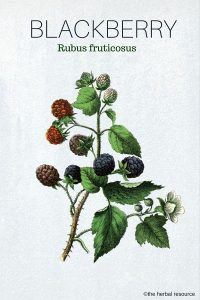The leaves contain triterpenes, flavonoids, saponins, vitamin C, organic acids, traces of essential oil, arbutin, hydroquinone and a high concentration of tannins.
The fully ripe fruits contain organic acids, sugar compounds, anthocyanins, pectin, niacin, flavonoids, mucous substances, carotenoids, vitamin C and several B vitamins.
The leaves, roots and root bark are used medicinally, while the fruits are mainly used for culinary purposes.
The astringent (constricting) effect of the leaves has been known for a long time, and writers of ancient herbal literature such as Hippocrates, Dioscorides and Pliny recommended them as herbal medicine.
The blackberry leaves, root bark and roots contain relatively large amounts of tannins with astringent properties and have been used internally as herbal remedies to treat digestive ailments such as diarrhea, dysentery and gastroenteritis.
Traditional uses also include the treatment of illnesses and ailments such as bleeding, slow healing wounds, fever, inflammation, cystitis, gout, infertility, vaginal discharge, flu,colds and cough.
Externally the blackberry leaves have been used to treat eczema and other rashes, acne, oily skin, injuries, hemorrhoids, fungal infections and pain and itch of insect bites and stings.
An extract made from leaves can be used as a gargle for inflammation of the mouth and throat, mouth ulcers, gum inflammation and a sore throat.
The fully ripe fruits of the blackberry can be eaten raw or cooked or used for juice, jams, liqueurs, and wines. The taste is strong and aromatic, but can vary slightly from one apomictic micro species to another.
The blackberries are high in vitamin C and sugar compounds and were therefore eaten in the past to treat scurvy.
There is some thought the berries are useful in increasing levels of red blood cells and may benefit those suffering from anemia.
The berries have a high content of antioxidants and could have a protective effect against some types of cancer.
Due to the content of organic acids and pectin, the ripe blackberries have a mild laxative effect but the immature berries contain relatively large amounts of tannins and therefore have an opposite effect.

Leave a Reply